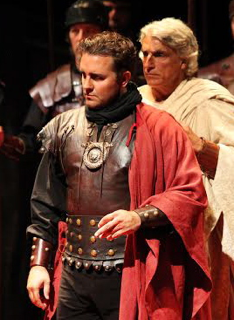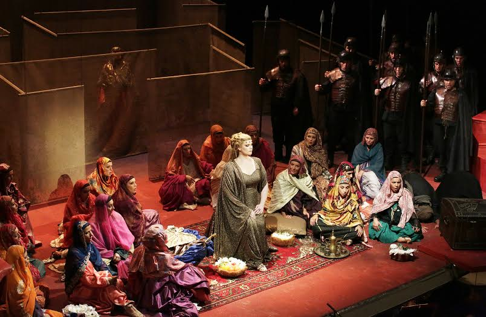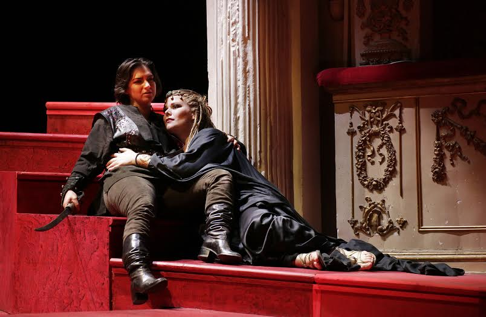
23 Aug 2014
Aureliano in Palmira in Pesaro
Ossia Il barbiere di Siviglia. Why waste a good tune.
English Touring Opera are delighted to announce a season of lyric monodramas to tour nationally from October to December. The season features music for solo singer and piano by Argento, Britten, Tippett and Shostakovich with a bold and inventive approach to making opera during social distancing.
This tenth of ten Live from London concerts was in fact a recorded live performance from California. It was no less enjoyable for that, and it was also uplifting to learn that this wasn’t in fact the ‘last’ LfL event that we will be able to enjoy, courtesy of VOCES8 and their fellow vocal ensembles (more below …).
Ever since Wigmore Hall announced their superb series of autumn concerts, all streamed live and available free of charge, I’d been looking forward to this song recital by Ian Bostridge and Imogen Cooper.
The Sixteen continues its exploration of Henry Purcell’s Welcome Songs for Charles II. As with Robert King’s pioneering Purcell series begun over thirty years ago for Hyperion, Harry Christophers is recording two Welcome Songs per disc.
Although Stile Antico’s programme article for their Live from London recital introduced their selection from the many treasures of the English Renaissance in the context of the theological debates and upheavals of the Tudor and Elizabethan years, their performance was more evocative of private chamber music than of public liturgy.
In February this year, Albanian soprano Ermonela Jaho made a highly lauded debut recital at Wigmore Hall - a concert which both celebrated Opera Rara’s 50th anniversary and honoured the career of the Italian soprano Rosina Storchio (1872-1945), the star of verismo who created the title roles in Leoncavallo’s La bohème and Zazà, Mascagni’s Lodoletta and Puccini’s Madama Butterfly.
Evidently, face masks don’t stifle appreciative “Bravo!”s. And, reducing audience numbers doesn’t lower the volume of such acclamations. For, the audience at Wigmore Hall gave soprano Elizabeth Llewellyn and pianist Simon Lepper a greatly deserved warm reception and hearty response following this lunchtime recital of late-Romantic song.
Collapsology. Or, perhaps we should use the French word ‘Collapsologie’ because this is a transdisciplinary idea pretty much advocated by a series of French theorists - and apparently, mostly French theorists. It in essence focuses on the imminent collapse of modern society and all its layers - a series of escalating crises on a global scale: environmental, economic, geopolitical, governmental; the list is extensive.
For this week’s Live from London vocal recital we moved from the home of VOCES8, St Anne and St Agnes in the City of London, to Kings Place, where The Sixteen - who have been associate artists at the venue for some time - presented a programme of music and words bound together by the theme of ‘reflection’.
'Such is your divine Disposation that both you excellently understand, and royally entertaine the Exercise of Musicke.’
Amongst an avalanche of new Mahler recordings appearing at the moment (Das Lied von der Erde seems to be the most favoured, with three) this 1991 Mahler Second from the 2nd Kassel MahlerFest is one of the more interesting releases.
‘And there was war in heaven: Michael and his angels fought against the dragon; and the dragon fought and his angels, And prevailed not; neither was their place found any more in heaven … that old serpent … Satan, which deceiveth the whole world: he was cast out into the earth, and his angels were cast out with him.’
If there is one myth, it seems believed by some people today, that probably needs shattering it is that post-war recordings or performances of Wagner operas were always of exceptional quality. This 1949 Hamburg Tristan und Isolde is one of those recordings - though quite who is to blame for its many problems takes quite some unearthing.
There was never any doubt that the fifth of the twelve Met Stars Live in Concert broadcasts was going to be a palpably intense and vivid event, as well as a musically stunning and theatrically enervating experience.
‘Love’ was the theme for this Live from London performance by Apollo5. Given the complexity and diversity of that human emotion, and Apollo5’s reputation for versatility and diverse repertoire, ranging from Renaissance choral music to jazz, from contemporary classical works to popular song, it was no surprise that their programme spanned 500 years and several musical styles.
The Academy of St Martin in the Fields have titled their autumn series of eight concerts - which are taking place at 5pm and 7.30pm on two Saturdays each month at their home venue in Trafalgar Square, and being filmed for streaming the following Thursday - ‘re:connect’.
The London Symphony Orchestra opened their Autumn 2020 season with a homage to Oliver Knussen, who died at the age of 66 in July 2018. The programme traced a national musical lineage through the twentieth century, from Britten to Knussen, on to Mark-Anthony Turnage, and entwining the LSO and Rattle too.
With the Live from London digital vocal festival entering the second half of the series, the festival’s host, VOCES8, returned to their home at St Annes and St Agnes in the City of London to present a sequence of ‘Choral Dances’ - vocal music inspired by dance, embracing diverse genres from the Renaissance madrigal to swing jazz.
Just a few unison string wriggles from the opening of Mozart’s overture to Le nozze di Figaro are enough to make any opera-lover perch on the edge of their seat, in excited anticipation of the drama in music to come, so there could be no other curtain-raiser for this Gala Concert at the Royal Opera House, the latest instalment from ‘their House’ to ‘our houses’.
"Before the ending of the day, creator of all things, we pray that, with your accustomed mercy, you may watch over us."

Ossia Il barbiere di Siviglia. Why waste a good tune.
The year is 1813, Rossini is 22 years old. He has two huge successes in Venice — L’italiana in Algeri, his first big comedy (there were seven smaller ones before), and Tancredi, his first big serious opera (there was two previous smaller ones). But on December 26 his next opera seria, Aureliano in Palmira is a flop at La Scala. [These are reminders for Rossinians.]
The libretto of Aureliano in Palmira is by La Scala’s librettist, the prolific Felice Romani who provided the librettos for all three Rossini La Scala commissions — Il Turco in Italia (1814), and Bianca e Falliero (1819) make the three. Romani is best known and appreciated for his many librettos for Donizetti and Bellini.
Most Romani librettos were set by multiple composers, though the three Rossini librettos were only set by Rossini. The turco in Italia libretto is dramatically quite complex enabling a stage director to produce it just now at the Aix Festival as Pirandello’s Six Characters in Search of an Author, a concept it wore perfectly. The libretto Aureliano in Palmira is no less complicated, compacting three or more major battles and their motivations and aftermath into two confusing acts. As is opera’s wont the libretto transforms documented military history into affective opera history which we Rossinians find far more real than mere history anyway.
 Jessica Pratt as Zenobia
Jessica Pratt as Zenobia
The Aureliano in Palmira libretto by Felice Romani was famously the cause of the failure of the opera. The librettist felt the need to defend his work, saying that he was never “discostato un momento dal verosimile” meaning that his story at least always seemed real, or that it could have been real. It was up to Rossini then make it real. The contemporary perception was that he did not, the fault of the singers, said Rossini. But it was a big job — they had to deal with the undying love of the Prince of Persia and the Queen of Syria thwarted again and again by the might of the Roman Empire led by the Emperor Aureliano who lusted intermittently after the Syrian Queen while never wavering from his military objectives.
It is hard to fault the quality of the music of Aureliano in Palmira because Rossini simply recycled it two years later into Il barbiere di Siviglia which was a flop too. But only at first. It quickly became one of the repertory’s more esteemed masterpieces. So Rossini was right, there was nothing wrong with the music.
The Rossini Festival had given us a simply splendid Barbiere the night before, so all of the tunes and colors were fresh in our ears. It befell the American conductor/scholar/critic Will Crutchfield to transform these musical lines and colors into intense periods of amorous passion, passionate rejection, heart breaking sorrow, vivid denunciation, etc. Miraculously he succeeded more or less. He did securely ground the performance in opera seria, transferring the onus upon us, the audience, to forget what we know so well. It was not always possible.
 Lena Belkina as Arsace, Jessica Pratt as Zenobia
Lena Belkina as Arsace, Jessica Pratt as Zenobia
The Rossini Festival entrusted the production of this difficult opera to director Mario Martone who couldn’t quite fit it onto the stage of the Teatro Rossini, clumsily spilling a Roman column and a throne out over the orchestra pit. Gratuitously some entrances onto the stage were made through from the audience, plus the chorus was often spread out onto the stage apron and left there, exceeding the boundaries of imagination imposed by the proscenium. These naive attempts at theatrical immediacy gave way to claustrophobia.
Filmy panels of various sizes flew in and out to make mazes, tents, battlefields, palaces, and mountains. Plus there was an elevated walkway hidden behind the brown backdrop that from time to time revealed soldiers, refugees, etc., trudging to and fro. That was it. Except for four real, live goats who burst onto the stage during a lovely chorus (though Asia may be in flames peasants rejoice in the freedom and poverty of their fields). Yes, one goat squatted to pee thereby adding a river.
The emperor Aureliano was sung by American tenor Michael Spyres, a believable general, a believable actor and a very good bel canto singer. Mr. Spyres does not possess the high notes to make Aureliano a Rossini hero. Zenobia, Queen of Syria, was sung by statuesque Australian soprano Jessica Pratt. Mme. Pratt has strong, secure high notes that impress audiences. She does not move easily on the stage. Arsace, the prince of Persia, was sung by Uzebekistan mezzo Lena Belkina, an accomplished singer who projects the feeling that she wishes she were somewhere else, or at least that you were not looking at her. The production did not make it clear who Publia was. Sung by Raffaella Lupinacci, Publia suddenly professed to be in love with Arsace in her one aria, and for a moment we had the hope that she and he would get together, that Aureliano and Zenobia would get together and the opera would end. It didn’t.
Michael Milenski
Cast and production information:
Aurelliano: Michael Spyres; Zenobia: Jessica Pratt; Arsace: Lena Belkina; Publia: Raffaella Lupinacci; Oraspe: Dempsey Rivera; Licinia: Sergio Vitale; Gran sacerdote: Dimitre Pkhaladze; Un Pastore: Raffaele Costantini. Chorus of the Teatro Comunale di Bologna. Orchestra Sinfonica G. Rossini. Conductor: Will Crutchfield. Metteur en scène: Mario Martone; Scenery: Sergio Tramonti; Costumes: Ursula Patzak; Lighting: Passquale Mari. Teatro Rossini, Pesaro, August 15, 2014.